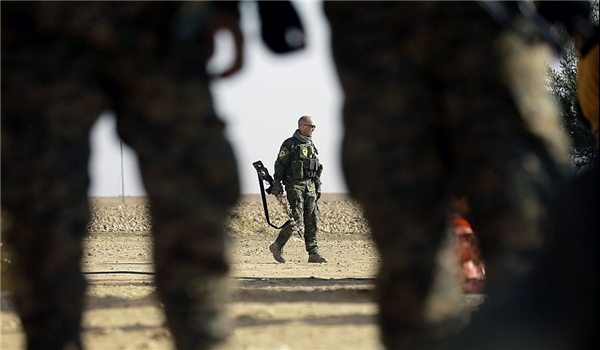
RNA - "The Americans are in the operations room as military advisors to give advice to the security bodies, including the army and the interior ministry but we in Hashd al-Shaabi don’t need the Americans," the commander said on Sunday.
Asked about the rumors about the deployment of Blackwater security firm forces at the Iraqi-Syrian borders, he said that the Central government has agreed with its presence but Blackwater has no power to control the borders or fight against the ISIL.
"The US presence in Iraq is aimed at fomenting and practicing seditions specially in the post-ISIL era," the commander warned.
Earlier this week, Hezbollah al-Nujaba, a major Iraqi Shiite resistance movement fighting the ISIL, had also warned that entrusting the infamous US security firm, Blackwater, with establishment of security at Baghdad-Amman highway threatens Iraq's national security.
"Blackwater attempts to conceal its identity but we know the firm and its nature and the company's presence in this vital and strategic place threatens Iraq's national security," Spokesman of Iraq's Hezbollah Brigades Mohammad Mohi said on Tuesday.
Warning the Iraqi government against Blackwater's dark record of activities, he said that the country's national security shouldn’t be endangered by those who don’t attach any importance to Iraq's interests and merely act based on the US and Israel's benefits.
Reports said in May that Blackwater, an American security firm, had signed a contract with Iraq to return to the country 7 years after repeated scandals by the US security companies forced them out of the war-torn country.
The highway from Baghdad to Amman, Jordan, cuts through the insurgent badlands of the Western Iraqi desert, and these days any truck driver risks confrontation with roving groups of terrorists.
As part of an American attempt to secure influence in the Iraq after the fight against the ISIL, the US government has helped broker a deal between Iraq and Olive Group, a private security company, to establish and secure the country’s first toll highway.
Head of al-Anbar province's council Faleh al-Issawi said at the time that the US firm will start its work on June 15.
The deal would last for 25 years and is known as a concession agreement, meaning the Iraqi government would put no cash upfront. The multimillion-dollar investment by Olive Group, in theory, would be recouped by tolls.
In 2015, three former employees of the US private military contractor once known as Blackwater were sentenced to 30 years in prison and a fourth received a life sentence, closing a sordid chapter of the Iraq conflict relating to the 2007 Nisour Square massacre in Baghdad.
In October 2014, Paul Slough, Evan Liberty and Dustin Heard were found guilty of 13 charges of voluntary manslaughter and 17 charges of attempted manslaughter, while Nicholas Slatten, the team’s sniper who was the first to open fire, was convicted on a separate charge of first-degree murder.
Slatten was sentenced to life; Slough, Liberty and Heard got 30 years each.
“In killing and maiming unarmed civilians, these defendants acted unreasonably and without justification,” the US attorney’s office said in a statement. “In combination, the sheer amount of unnecessary human loss and suffering attributable to the defendants’ criminal conduct on September 16, 2007, is staggering.”
The massacre left 14 civilians dead and at least 17 wounded. “None of the victims was an insurgent, or posed any threat to the Raven 23 convoy,” the government said, in a sentencing memorandum filed to the court on.
847/940